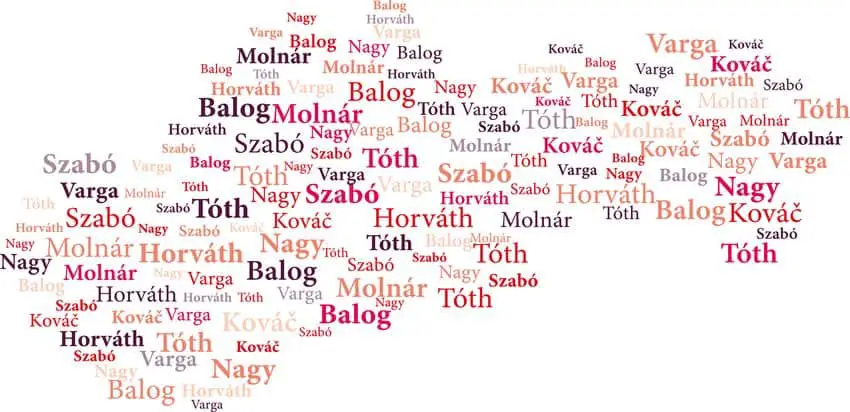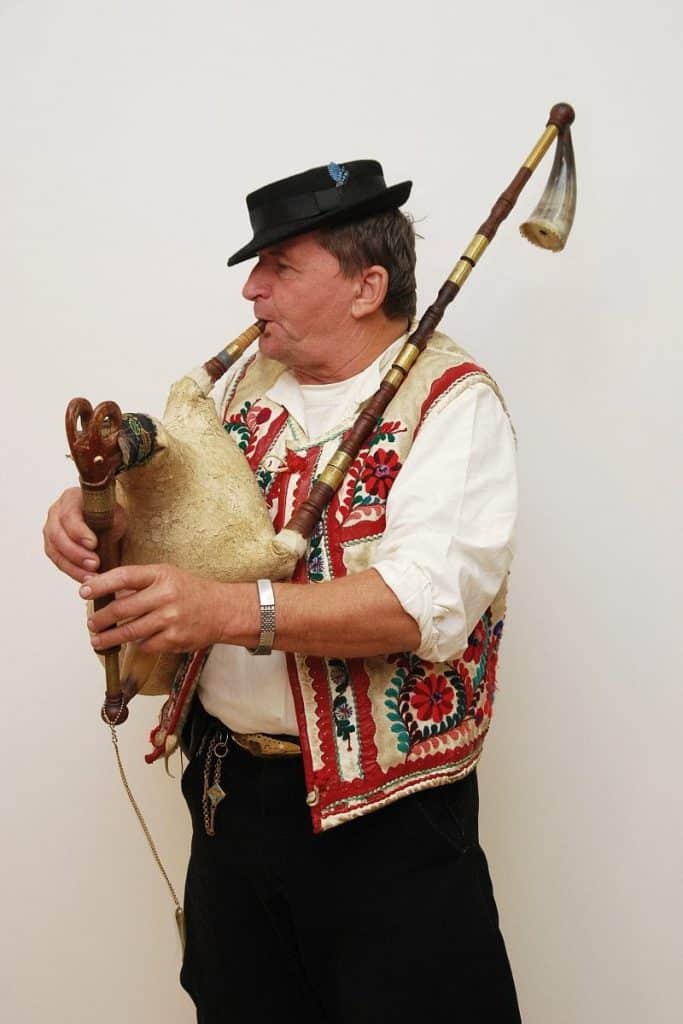As an Amazon Associate, I earn from qualifying purchases with no additional costs for you.
Slovak last names are derived from first names, crafts, relationships, origin, social status, characteristics, and nicknames. However, the origin of the Slovak surnames can be very interesting in some cases. Find below a list of the seventeen most common Slovakian surnames:
| # | Last Name | Frequency (in 2017) |
|---|---|---|
| 1. | Horváth / Horváthová | 31305 |
| 2. | Kováč / Kováčová | 29816 |
| 3. | Varga / Vargová | 23205 |
| 4. | Tóth / Tóthová | 23104 |
| 5. | Nagy / Nagyová | 20683 |
| 6. | Baláž / Balážová | 14173 |
| 7. | Molnár / Molnárová |
13636 |
| 8. | Szabó / Szabová | 13371 |
| 9. | Balog / Balogová | 10438 |
| 10. | Lukáč / Lukáčová | 9914 |
| 11. | Novák / Nováková |
9712 |
| 12. | Kovács / Kovácsová | 9567 |
| 13. | Polák / Poláková | 9352 |
| 14. | Gajdoš / Gajdošová | 8777 |
| 15. | Kollár / Kollárová | 8699 |
| 16. | Hudák / Hudáková | 7985 |
| 17. | Németh / Némethová | 7491 |
| (Data source) | ||
This post contains seventeen most commonly used Slovak last names with an explanation of their origin and where they come from. I bet you find some of them very interesting, so continue reading.
If you want to buy Slovak gifts or useful Slovak products, you can find them by clicking here (Amazon link).
The Most Common Slovak Last Names and Their Explanation

In Slovakia, the method of naming by name and surname was introduced by the emperor Joseph II. in 1786.
In 2003 there were 185 288 surnames of men and women registered in Slovakia. With a population of approximately 5.4 million, it means there are roughly 29 people per surname in Slovakia.
Assuming that half of the figures are men and half women, it can be said that there are about 92,600 families by different surnames in Slovakia.
Interesting fact: In Slovakia, female inflection for surnames is used. It means we add -ová or -á at the end to each surname for females in Slovakia.
Here is the list of 17 most common Slovak last names:
1 Horváth / Horváthová
The origin of this last name appears to be linked to the migration of people from southern Europe, especially Croatia. Thus, the surname Horváth can be simply explained as the Hungarian name of Croat.
2 Kováč / Kováčová
The origin of this surname is clearly associated with the craft. The original bearers of this surname devoted themselves to ironing and making metal tools or weapons.
Interesting fact: The first president of the Slovak Republic was Michal Kováč.
3 Varga / Vargová
This surname is also related to craft. The name Varga in the past was referred to a man who was involved in the repair of footwear and this surname came to Slovakia from Hungary.
Interesting fact: The last name Varga is the most common surname in Hungary.
4 Tóth / Tóthová
This surname comes from Hungarian as well and it is the Hungarian name of Slav from Hungary. The most famous bearer of this surname is Matej Tóth, the Olympic champion within the 50 km walk.
5 Nagy / Nagyová
Even the fifth most common surname in this ranking is of Hungarian origin. The word nagy in Hungarian means big.
6 Baláž / Balážová
It is a Slovak surname and is derived from the archaic form of the male name Blažej. It is the most common last name in Central Slovakia.
TIP: Check out my list of recommended Slovak products. They are perfect as gifts, or you will use them during your visit to Slovakia (Amazon links)
- Slovakia Flag
- The book about Slovak History
- Slovak Travel Guide
- Slovakia Adventure Map (by National Geographic)
- T-shirt with Slovakia Flag
- Slovakia Shot Glass
- Legendary Horalky Biscuit (Original)
7 Szabó / Szabová
We also assumed the name Szabó from our southern neighbors and its origin is related to the profession. Szabó is the Hungarian word for a tailor.
8 Molnár / Molnárová
Even this, purely sounding Slovak surname, has its roots in Hungary. Molnar means a miller in the Hungarian language.
9 Balog / Balogová
It is estimated that this surname is derived from the name of the settlement Balog nad Ipľom, which is located in Eastern Slovakia, and therefore it is most often found in this area.
10 Lukáč / Lukáčová
Lukáč is a Slovak surname derived from the male name Lukáš and it is of Slovak origin.
11 Novák / Nováková
The surname Novák is derived from the adjective nový (new) and its origin is in the Czech Republic.
Interesting fact: The last name Novák is the most common surname in the Czech Republic.
12 Kovács / Kovácsová
Surname Kovács is the Hungarian version of the Slovak surname Kováč, which was ranked second in this ranking.
13 Polák / Poláková
This Slovak surname is derived from the Slovak word Poliak, which denotes the inhabitants of Poland.
14 Gajdoš / Gajdošová
The surname originated from the basic form of the general noun gajdoš, which in Slovak denotes someone who plays or knows how to play the Bagpipes.

15 Kollár / Kollárová
The surname was derived from the word kolár (Wheelwright), which was referred to as an expert in the manufacture of wheels and other wooden parts of the wheeled car.
16 Hudák / Hudáková
The surname Hudák originated from the Slovak word húsť – to play a musical instrument, especially the violin, and it has been present in the Slovak region since the 15th century.
17 Németh / Némethová
Another surname whose origin is in Hungarian and means the Hungarian designation for the inhabitants of Germany.
TIP: Many of you who are reading this article have Slovak last names. So you might be interested in visiting Slovakia. Do you know how many people in Slovakia can speak English? Find out the answer in the article below:
Do Slovaks speak English? Read This Before Your Arrival
Origin of Slovak Last Names
A funny or interesting fact about Slovakian last names is that almost all of them are Hungarian last names. And why is this possible?
The reason is mainly that Slovakia was part of the Austria-Hungary Kingdom for more than 1000 years and the Hungarian language at that time was the official language in Slovakia.
Therefore, even though there were Slovak alternatives to Hungarian surnames, the Hungarian versions of these surnames were used. For example, the last name Horváth is called Chorvát in the Slovak language.
Where do Slovak Surnames Come from?
As I wrote at the beginning, most of the surnames have their origins in the names of the occupations in which people worked in the past and visual or personality traits of people.
However, the origin of Slovak surnames originated from several sources. So here is the list with Slovak last names explained by their origin:
Surnames by occupation
These surnames were created with a so-called zero suffix, which means that the used surname was the very name of the job. The names of jobs came from Slovak or Hungarian language, or even from Latin names of jobs.
For example, the surname Bača came from the name of a man who cared for sheep.
Surnames according to visual and personality characteristics
Many surnames originated from words referring to the bearers of qualities, denoting the physical or mental qualities of a person, according to which the community characterized and called it.
Most often, surnames were formed from the nicknames of their bearers and they were sometimes funny or cool. For example, the last names such as Opatrný (cautious), Dlhý or Dlhoš (long), or Plačko (crying man).
Surnames from given names
Surnames in the Christian environment originated from various official canonized forms of names from the New Testament, Old Testament, names of Saints, and other names.
For example, a large number of surnames like Petráš, Peterka, or Petrík were created from the New Testament name Peter.
Surnames according to family relationships
An interesting group of last names consists of family names formed from family relations. Among them, perhaps the most common last names came from the word baba, which means grandmother in English.
For example, surnames such as Babka, Babečka, or Babiak originated from this word.
Surnames according to social status
Some of the Slovak surnames originated from the social status of their bearers. It should be remembered that some arose as an ironic name for this social status.
One such social status was the designation of the word zeman, which denotes members of the lower nobility. The surnames such as Zeman, Zemančík or Zemko originated from this word.
Surnames from the names of cities, regions, states and others
And the last part of surnames comes from the names of cities, regions, states, and other geographical names.
For example, three of the most common Slovakian last names belong to this group: Tóth (Hungarian name for Slavic people), Polák (inhabitant of Poland), and Németh (Hungarian name for Germans).
Conclusion
Our first names, but most of all the surnames, are part of our character. Slovakian last names come from different sources and I must say that our ancestors often showed considerable creativity in their creation.
Let me know in the comment section about your surnames and where they come from. And if your surname sounds Slovak, write it to me and I’ll try to find out if it really comes from Slovakia 🙂
The data source in this post comes from the book Zo studnice rodnej reči 2 written by Katarína Balleková and Miroslav Smatana.
TIP: Are you interested in Slovak traditions? We have a lot of traditions for events like Christmas and New Year’s Eve. Check out our traditions in the article below:
How does Slovakia Celebrate Christmas? Dinner, Customs & Traditions
